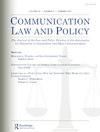Protecting Journalists’ Sources Without a Shield: Four Proposals
IF 0.2
Q4 LAW
引用次数: 1
Abstract
Journalists’ right to protect the identities of their confidential sources relies on an inconsistent set of court decisions based on constitutional and common law interpretations and state statutes. Efforts to bring some consistency to federal law through the passage of a shield law have stalled while journalists face new threats because of the vulnerability of their communications to discovery and monitoring by third parties. Also, the entry of non-professional communicators into the news ecosystem is causing courts to reevaluate and redefine long-standing protections. This article proposes four ways that sources could be better protected from unmasking without the passage of a shield law: improving whistleblower laws to better protect people who report illegal or unethical actions to the media; vastly reducing the number of government secrets to make “leaking” less attractive or necessary; changing legal strategy to focus on protecting the anonymity of sources instead of the rights of journalists to keep secrets; and more widespread and intelligent use of encrypted applications and software could all improve the security of journalistic sources. Because of the complexity of amending multiple whistleblower protection laws and changing the government’s document classification system, the article argues that the best solutions may be to persuade news organizations to change legal tactics and to use better encryption technology.无护盾保护记者消息来源:四项建议
记者保护其机密消息来源身份的权利依赖于一系列不一致的法院判决,这些判决基于宪法和普通法解释以及州法规。由于记者的通讯容易被第三方发现和监控,他们面临着新的威胁,通过《信息保护法》使联邦法律保持一致性的努力陷入停滞。此外,非专业传播者进入新闻生态系统导致法院重新评估和重新定义长期存在的保护。本文提出了在不通过保护法的情况下更好地保护消息来源免遭曝光的四种方法:改进举报人法,以更好地保护向媒体报告非法或不道德行为的人;大幅减少政府机密的数量,以减少“泄密”的吸引力或必要性;改变法律策略,侧重于保护消息来源的匿名性,而不是记者的保密权利;更广泛、更智能地使用加密应用程序和软件,都可以提高新闻来源的安全性。由于修改多项保护举报人的法律和改变政府的文件分类系统的复杂性,这篇文章认为,最好的解决方案可能是说服新闻机构改变法律策略,使用更好的加密技术。
本文章由计算机程序翻译,如有差异,请以英文原文为准。
求助全文
约1分钟内获得全文
求助全文
来源期刊
CiteScore
0.60
自引率
33.30%
发文量
7
期刊介绍:
The societal, cultural, economic and political dimensions of communication, including the freedoms of speech and press, are undergoing dramatic global changes. The convergence of the mass media, telecommunications, and computers has raised important questions reflected in analyses of modern communication law, policy, and regulation. Serving as a forum for discussions of these continuing and emerging questions, Communication Law and Policy considers traditional and contemporary problems of freedom of expression and dissemination, including theoretical, conceptual and methodological issues inherent in the special conditions presented by new media and information technologies.

 求助内容:
求助内容: 应助结果提醒方式:
应助结果提醒方式:


